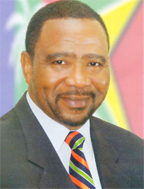PNCR leader Robert Corbin yesterday described that the AFC’s decision to rule out any alliance between the two parties as “short sighted,” while saying there is still room for it to identify with the desires of the people.

Corbin declined to go into detail on the party’s decision at a news conference at Congress Place yesterday, explaining that further comments may not be in the interest of promoting the climate for the partnerships, which he said many Guyanese have positively supported over the past months. “There is still room for the AFC to identify with the desires of the people of Guyana and it is now left for the membership of that party to determine its future role and actions,” he said, having noted that it is the right of every party to determine its actions and programmes. “The future of Guyana and the wellbeing of its citizens are too important to be sacrificed at the altar of partisan politics,” he added.
The efforts to formalise a joint opposition collation going into next year’s general election against the PPP/C suffered a setback last weekend when the AFC’s National Executive Committee decided it would not ally itself with the main opposition PNCR. AFC leader Raphael Trotman, who has publicly signalled support for a collation with all opposition forces, has since said that the party has been looking at the blueprint put forwarded by a citizens group working towards a People’s Partnership. The PNCR along with GAP, WPA and the NFA have decided to pursue a broad partnership despite the AFC’s decision.
At his party’s weekly press conference yesterday, Corbin said any objective evaluation of the political situation in Guyana since universal adult suffrage was won in 1953, would reveal that social and economic development became victims to political and racial polarisation. “If Guyana is to progress and the welfare of its citizens is given paramountsy, a paradigm shift is essential,” he explained.
Corbin noted that since 2002 the party’s committed itself to shared governance and inclusivity, including its willingness to share executive authority and to explore and negotiate imaginative forms of governance and reform of the national, regional and local government systems to ensure that the goal of full inclusivity is realised.
He emphasised that any alliance, coalition or partnership must be welded by a common desire to take the country forward on an agreed platform that can guarantee justice and development for all the people of Guyana. It cannot be based merely on a desire for political power and to replace the current repressive regime, he said, while also arguing that the discussion cannot be merely focused on the presidency, but on the programmes to be implemented. According to him, essential issues include implementing the constitutional requirements that would allow for the effective functioning of parliament; respectful political interface; successful collaboration between public and private sector organisations; effective cooperation between races; and participation and involvement of civil society organisations in the tasks of building of one Guyana. “The sordid performance of the PPP, and the state of Guyana, has primarily motivated the positive responses, by a wide cross section of our society, to calls for partnership, alliances, and coalition and shared governance,” he noted. “The uniting of our many peoples is a pre-condition for achieving peace and national cohesion.”
However, he said any partnership or alliance cannot be “premised on the selfish promotion of any individual party or group with a desire for expansion at the expense of others.” That approach, he explained, falls into the model that has been followed since 1953. “Any alliance or partnership must, therefore, include a plan for political action which defines the principles and outlines the programmes that must guide the leaders and people; not a mere list of promises but a solemn commitment and a set of standards and goals to which the participants will commit themselves,” he said. Further, he added that the rights and aspirations of all must be respected, protected and enforced, since they are the foundations of a stable society. Any attempt to dismiss 40% of the electorate, despite personal feelings and ambitions, is to avoid the political reality in Guyana, he posited. “The PNCR recognises that, while we desire to change the system of governance, we cannot adopt a dogmatic position that we have all the answers. We remain prepared to meet with all stakeholders around the table, without any pre-conditions, to fashion a mutually agreeable national programme that addresses the concerns of all,” he said.





